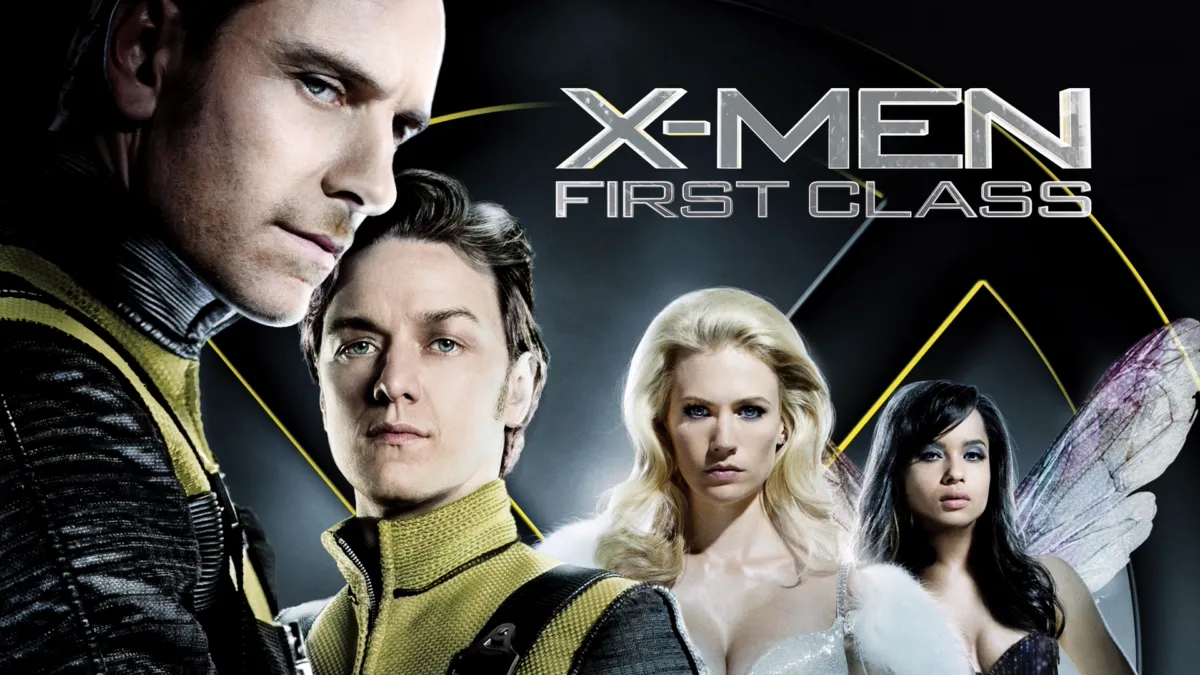X-Men: First Class (2011)

“X-Men: First Class,” directed by Matthew Vaughn and released in 2011, serves as both a thrilling superhero film and a poignant exploration of identity, friendship, and the consequences of prejudice. As the fifth installment in the X-Men franchise and a prequel to the original trilogy, this film not only delves into the origins of iconic characters but also sets the stage for a broader narrative about humanity’s struggle with difference and acceptance. The backdrop of the Cuban Missile Crisis in 1962 adds historical weight, creating a rich tapestry for the unfolding drama between mutants and humans.
At its core, “X-Men: First Class” follows the journey of two pivotal characters: Charles Xavier, also known as Professor X (played by James McAvoy), and Erik Lensherr, known as Magneto (played by Michael Fassbender). The film opens with a powerful prologue set during World War II, depicting young Erik’s traumatic experiences in a concentration camp, where he discovers his magnetic powers. This formative moment shapes Erik’s worldview, instilling a deep-seated belief that mutants must protect themselves from humanity’s inherent cruelty.
In stark contrast, we meet Charles Xavier, who is introduced as a gifted young telepath at Oxford University. He embodies optimism and a belief in coexistence between mutants and humans. The film artfully juxtaposes these two characters, setting the stage for their eventual ideological clash. While Charles envisions a future where mutants and humans can live in harmony, Erik’s experiences have led him to adopt a more militant stance, emphasizing the necessity of self-defense and empowerment.
The narrative unfolds as the two join forces to form a team of mutants to confront a common threat: Sebastian Shaw (played by Kevin Bacon), a powerful mutant seeking to ignite nuclear war between the United States and the Soviet Union. Shaw’s plans hinge on exploiting the fear and division between humans and mutants, making him a formidable antagonist. The stakes are high as the film weaves together personal narratives with broader geopolitical tensions, using the Cuban Missile Crisis as a backdrop for the impending conflict.
One of the film’s strengths lies in its ensemble cast, which includes a diverse array of mutants, each with their unique abilities and struggles. Mystique (played by Jennifer Lawrence) is particularly notable, as she grapples with her identity and the societal pressures to conform to conventional beauty standards. Her journey of self-acceptance and empowerment becomes a significant thread in the narrative, illustrating the film’s overarching themes of diversity and acceptance. As she navigates her relationship with both Charles and Erik, Mystique embodies the internal conflict many face when reconciling their identities with societal expectations.

Visually, “X-Men: First Class” is a stunning cinematic achievement. The film’s aesthetic captures the essence of the 1960s, from the fashion and music to the cultural references of the time. The production design immerses viewers in a vibrant world, contrasting the vibrant colors of the mutant team’s costumes with the darker, more ominous tones associated with Shaw and his followers. The action sequences are expertly choreographed, blending CGI with practical effects to create visually striking moments that maintain a sense of realism.

The film’s score, composed by Henry Jackman, adds to the emotional resonance of the story. The music complements the film’s tone, enhancing the tension during key moments and underscoring the character development that unfolds throughout the narrative. Jackman’s compositions effectively evoke feelings of nostalgia, hope, and impending conflict, drawing viewers deeper into the characters’ journeys.
Thematically, “X-Men: First Class” addresses pressing issues of discrimination, acceptance, and the ethical dilemmas surrounding power. The film’s exploration of the mutant experience serves as an allegory for various forms of prejudice and discrimination that persist in society. The characters’ struggles with their identities reflect broader societal issues, prompting viewers to consider their own biases and the importance of empathy and understanding.

The relationship between Charles and Erik is at the heart of the film, illustrating the complexities of friendship and loyalty in the face of ideological differences. As they assemble their team of mutants, their dynamic shifts from camaraderie to conflict, culminating in a poignant climax that forces them to confront their beliefs and the choices they must make for the future of both mutants and humans. This emotional weight adds depth to the narrative, elevating it beyond typical superhero fare.

In conclusion, “X-Men: First Class” is a masterful blend of action, character development, and social commentary. Directed by Matthew Vaughn, the film not only reinvigorates the X-Men franchise but also engages audiences with its exploration of identity, acceptance, and the moral complexities of power. Through the journeys of Charles Xavier, Erik Lensherr, and their team of mutants, the film invites viewers to reflect on their own beliefs and the importance of embracing diversity. With its rich narrative, stunning visuals, and powerful performances, “X-Men: First Class” stands as a landmark in the superhero genre, resonating with audiences long after the credits roll. It serves as a reminder that our differences can be our greatest strength and that understanding and acceptance are essential for a harmonious future.
Suggested videos for you:
Suggested videos for you:
Suggested videos for you:











